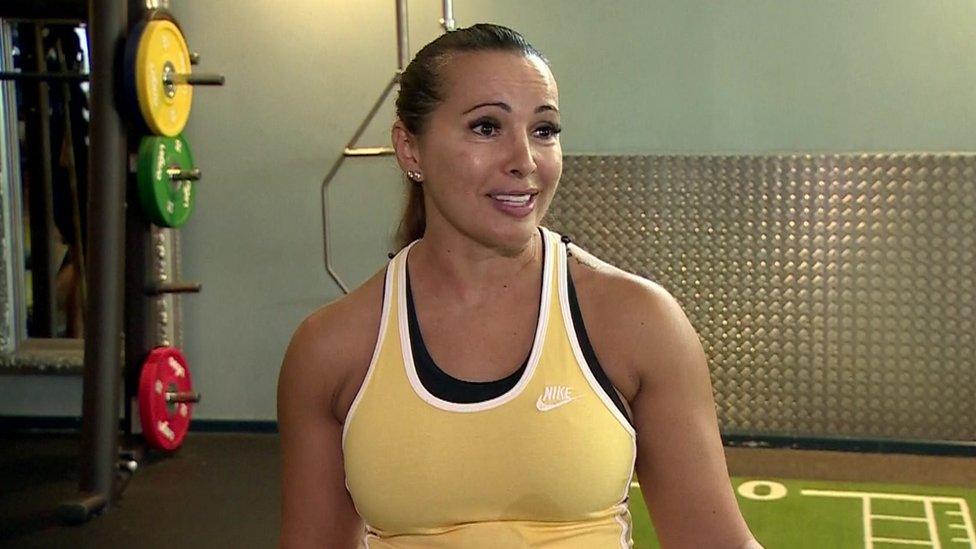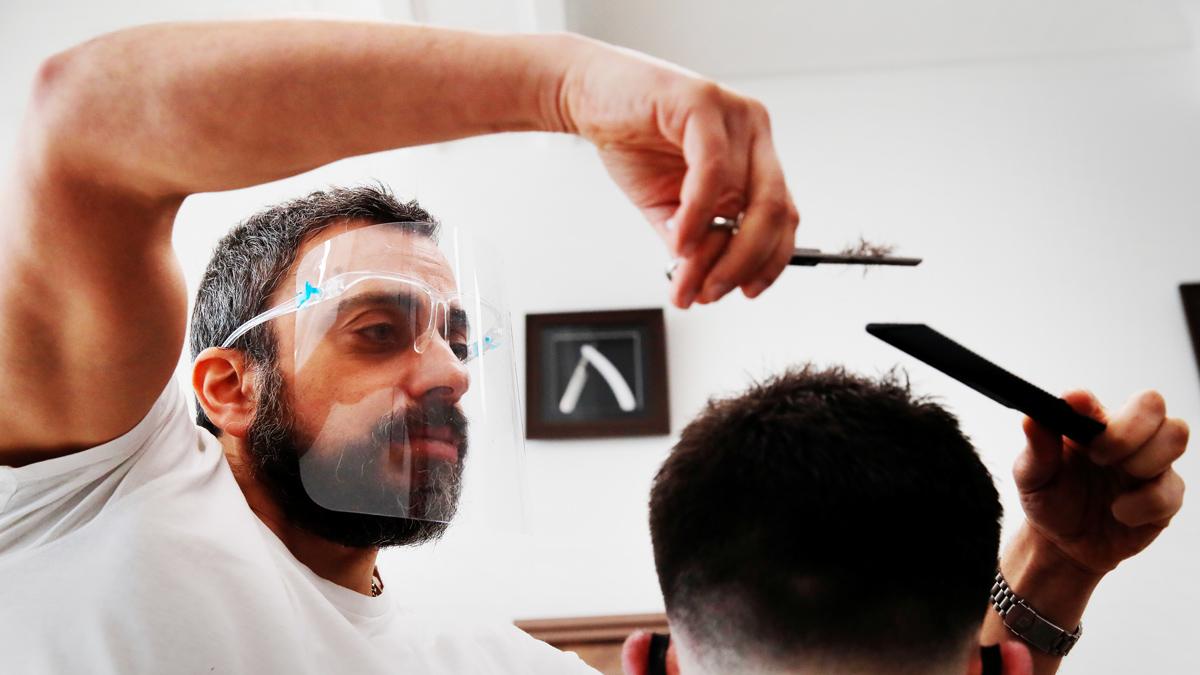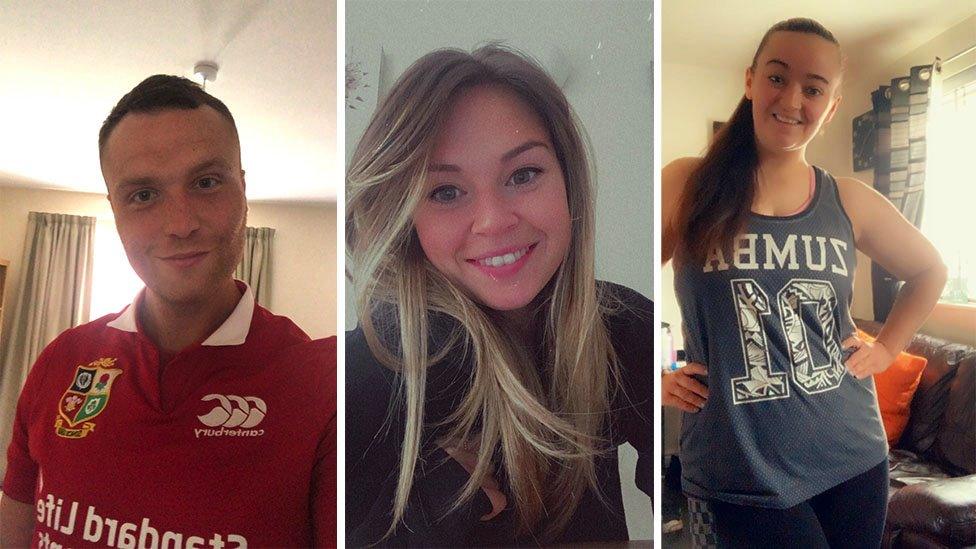Coronavirus: Indoor gyms and pools in England start to reopen
- Published
The BBC's Katy Austin on the new safety measures at a gym that has reopened in Twickenham
Indoor gyms, swimming pools and other indoor sports facilities have seen a cautious return of customers as they reopen their doors for the first time since March.
Gym-goer Jamelah May said it was great to be one of the first people through the doors of her south-west London gym.
"As well as physically getting back to where I want to be, mentally it's had a massive impact," she said.
However, it's thought at least a third of public facilities have stayed shut.
The leisure sector has warned it will still struggle because of the financial impact of the coronavirus pandemic.
Gyms that reopen must follow strict hygiene and social distancing measures, such as limiting the number of people using the facility and spacing out equipment.
Facilities should also reduce class sizes and ensure adequate ventilation, according to government guidance issued earlier this month, external.

Jamelah May, who has been going to the same gym for 12 years, said she didn't sleep last night because she was so excited to come back
Outdoor gyms and pools have been open in England since 4 July because there is less risk of catching coronavirus outdoors.
Indoor gyms in Northern Ireland opened earlier this month, but they remain closed in Scotland and Wales.
Swim England has published its own guidance, external for operators on how to reopen indoor pools, including implementing a one-way entry and exit system.
Its chief executive Jane Nickerson said financial problems meant less than 20% of pools will reopen this weekend.
The cost of heating the pools and implementing the new guidelines, as well as the reduced footfall and fewer swimming lessons, mean many cannot afford to open, she told BBC Radio 4's Today programme.
She also called on the government to give more financial support to struggling pools, saying the money would also help with its plan to tackle obesity.
Meanwhile, Health Secretary Matt Hancock has confirmed gyms and sports facilities will not reopen in Luton or Blackburn with Darwen due to an increase in coronavirus cases in those areas.
The BBC's Mike Bushell explores new safety measures at the London Aquatics Centre
Luke Willmott, manager of the Castle Gym in Nottingham, said his gym was at capacity by about 06:25 BST, and it was "only right for people to have a choice" to return.
He said returning members are being advised to spray equipment with sanitiser before, during and after use - but there were "loads" of membership cancellations during lockdown.
"I think it's down to people's circumstances," he said. "A lot of our community have supported us which has been fantastic... but it has been a struggle."

'I still don't think it's 100% safe'

Michelle and Tomasz used to train in the gym together. But the couple from Putney, south-west London, have come to different conclusions about whether to go back now that it's reopened.
Michelle has cancelled her membership and says she won't return for the foreseeable future, while Tomasz is already out the door for his first gym session since lockdown began.
"I work in the leisure industry - I still don't believe it's 100% safe," says Michelle. "There is a lot of equipment crammed in there and the gym doesn't have very good ventilation." Instead, she's been using resistance bands and training outside.
But for Tomasz, who used to do bodybuilding in Poland, the gym is part of his lifestyle. "To not have that, it affects his mindset," Michelle says. "Training outside doesn't do it for him. I can't stop him going to the gym and he can't make me go!"

Paul Douglas-Smith, manager of the Littlehampton Wave swimming pool, said the facility can now take 40 swimmers at once, down from more than 130 before the pandemic.
He said the pool will be hit financially, and is aiming for a "staged return".
"We're looking at the fitness swimmers first and then we're looking at the family and the junior swimming. That will probably follow in the next two or three weeks," he said.
Despite the relaxed rules, industries bodies have warned many facilities could be forced to close amid the pandemic.
Community Leisure UK, the members' association that specialises in representing charitable leisure and culture trusts across England, Scotland and Wales, estimates that 48% of all public leisure facilities face closure, meaning as many as 1,300 could disappear by the end of the year, along with more than 58,000 jobs.

Analysis
By Katy Austin, BBC News business correspondent
Some fitness clubs saw queues outside their doors this morning and members we spoke to said they were overjoyed to be back.
However, it's inevitable some people do not yet feel ready to exercise around others indoors.
The fortunes of gyms, pools and leisure centres depend on instilling confidence in the safety measures they've put in place, as well as how much people are prepared to spend at a time of economic uncertainty.
Membership cancellation rates have reached 15-23% due to the impact of the pandemic, trade body UKActive said. Meanwhile, online classes and home equipment sales have boomed.
Today is an important milestone, but not all venues can afford to open straight away under the new arrangements. UKActive said support will still be needed with costs such as back-dated rent in coming months.

The District Councils' Network (DCN) is also warning of the "uncertain future" faced by gyms and leisure centres, pointing out that the sector is expected to lose about £305m this year.
The DCN, which represents 187 district councils in England that provide leisure services, is calling on the Treasury to provide a rescue package to save leisure centres from collapse.
Leisure centres and indoor gyms, along with swimming pools and other indoor sports facilities were closed on 21 March as part of measures to prevent the spread of coronavirus.

PANORAMA: Lifting the lockdown in Salford
I MAY DESTROY YOU: The groundbreaking drama making headlines in lockdown


- Published4 May 2021

- Published25 July 2020
